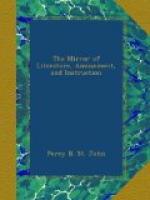A certain author was introduced one day by a friend to Mr. Addison, who requested him at the same time to peruse and correct a copy of English verses. Addison took the verses and found them afterwards very stupid. Observing that above twelve lines from Homer were prefixed to them, by way of motto, he only erased the Greek lines, without making any amendment in the poem, and returned it. The author, seeing this, desired his friend who had introduced him to inquire of Mr. Addison the reason of his doing so. “Whilst the statues of Caligula,” said he, “were all of a piece, they were little regarded by the people, but when he fixed the heads of gods upon unworthy shoulders, he profaned them, and made himself ridiculous. I, therefore, made no more conscience to separate Homer’s verses from this poem, than the thief did who stole the silver head from the brazen body in Westminster Abbey."[3]
[3] In Henry the Seventh’s chapel.
* * * * *
A furious wife, like a musket, may do a great deal of execution in her house, but then she makes a great noise in it at the same time. A mild wife, will, like an air-gun, act with as much power without being heard.
L—W—R M.
* * * * *
ST. MARTIN S LITTLE SUMMER.
In Time’s Telescope for 1825, we are told that the few fine days which sometimes occur about the beginning of November have been denominated, “St. Martin’s Little Summer.” To this Shakspeare alludes in the first part of King Henry the Fourth (Act. I, Scene 2), where Prince Henry says to Falstaff, “Farewell, thou latter spring! farewell, All-hallowen summer!” And in the first part of King Henry the Sixth, (Act I, Scene 2), Joan La Pucelle says,
“Assign’d am I to be the English
scourge—
This night the siege assuredly I’ll
raise:
Expect St. Martin’s Summer,
halcyon days,
Since I have entered into these
wars.”
W.G.C.
* * * * *
SCRAPS.
(For the Mirror.)
M.F. Cuvier has found that all marshy countries are remarkable for the small number of births in autumn, or the period when the influence of the marshes is most dangerous. Consequently, the marshes do not diminish the population by adding to the number of deaths alone, but by attacking the fecundity.
* * * * *
In Guiana balls are made of caoutchouc, for children to play with; and so elastic are they, that they will rebound several times between the ceiling and floor of a room, when thrown with some force.
* * * * *
In turtles’ eggs, the yolk soon becomes hard on boiling, whilst the white remains liquid: a fact in direct opposition to the changes in boiling the eggs of birds.




